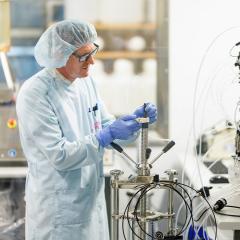Researchers at The University of Queensland are celebrating Australia’s largest investment in humanities, arts, social sciences and Indigenous research infrastructure.
UQ is a senior partner in the HASS and Indigenous Research Data Commons led by the Australian Research Data Commons (ARDC), which has been awarded a $25 million co-investment from the Australian Government.

The new investment will provide a more secure basis for a broad range of research benefiting many Australians, from preserving language to GeoSocial data integration.
The funding has been provided in the 2023 National Collaborative Research Infrastructure Strategy (NCRIS) Funding Round, with co-investment from national partners delivering lasting national digital infrastructure to support multi-disciplinary research in Australia.
Language Data Commons of Australia
UQ’s Professor Michael Haugh, who leads the Language Data Commons of Australia as part of the HASS and Indigenous Research Data Commons, said much of Australia’s language data was scattered, hard to find, and in danger of being lost.
“Many of Australia’s collections remain under-used and our researchers lack the tools and skills to exploit their research potential,” Professor Haugh said.
“Secure storage and ongoing governance means that legacy language datasets, as well as datasets yet to be collected, can be used to answer new research questions and check the results of previous work.
“This is an important step towards making HASS research better documented and more accountable and will open up the social and economic possibilities of Australia’s linguistic heritage.”
Professor Haugh also leads the Australian Text Analytics Platform which provides Australian researchers with access to an online platform for processing and analysing unstructured texts.
Sandpit in the Sandstone (Improving Indigenous Research Capabilities)
Sandpit in the Sandstone is a UQ-led project in the Improving Indigenous Research Capabilities program, led by Indigenous Data Network at the University of Melbourne.
The UQ team is led by UQ Associate Dean (Indigenous Engagement) Associate Professor Stephanie Gilbert, Dr Amberyn Thomas from UQ Libraries and Dr Penny Holliday.
Dr Holliday said the partnership focussed on improving Indigenous Data Governance of collections held in UQ galleries, libraries, archives and museums.
“We are excited that the UQ Library Aboriginal and Torres Strait Islander Services and Collections Team is now partnering with us and will co-collaborate with Indigenous Communities testing best practices for digitising and cataloguing artefacts on Country,” Dr Holliday said.
“Under the leadership of Dr Thomas, the library team is continuing their great work on how to best present collections, working with Communities on presenting collections via iPads, digital literacy requirements for enhancing community engagement, nuanced cataloguing where Indigeneity and good governance are both represented in catalogues, and developing a researcher guide for best practices for applying metadata.”
GeoSocial data integration (Integrated Research Infrastructure for Social Sciences)
A team of researchers at UQ’s Institute for Social Science Research has partnered with the Australian Urban Research Infrastructure Network to design and pilot the GeoSocial data integration service.
Research Group Leader Associate Professor Wojtek Tomaszewski said the service will enable social survey data to be augmented with geospatial information to capture the characteristics of the places in which people live.
“This will create distinct new research opportunities through leveraging characteristics of the environment, such as community profiles, to model their impact on socio-economic outcomes of individuals, and to inform the design of place-based policy responses,” Dr Tomaszewski said.
Looking ahead
The latest investment supports the continued delivery and expansion of the HASS and Indigenous Research Data Commons until 2028.
UQ is also participating in the co-design process for two new areas which have been added to the ARDC’s scope:
- Media(ted) data – facilitating access to large collections of dynamic digital data and providing the analysis tools and skills for insights into Australian society and culture.
- Creative arts – developing a national approach to Australian arts-based collections for improved discovery and exploration for academics, arts industries, government, and the general public.
More information: https://ardc.edu.au/article/hass-and-indigenous-research-data-commons-receives-25-million/



